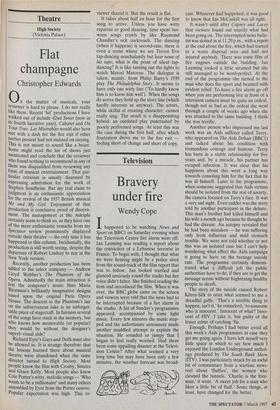Television
Bravery under fire
Wendy Cope
Ihappened to be watching News and Sport on BBC1 on Saturday evening when the Television Centre fire alarm went off. Jan Leeming was reading a report about the conviction of a Lebanese terrorist in France. To begin with, I thought that what we were hearing might be a police siren from the sound-track of the film report that was to follow. Jan looked startled and glanced anxiously round the studio but her voice didn't falter. She finished reading the item and introduced the film. When it was over, the BBC globe came on the screen and viewers were told that the news had to. be interrupted because of a fire alarm in the studio. A list of Sunday's programmes appeared, accompanied by some light music. Every few minutes the music stop- ped and the unfortunate announcer made another muddled attempt to explain the situation. He sounded so jumpy that I began to feel really worried. Had there been some appalling disaster at the Televi- sion Centre? After what seemed a very long time but may have been only a few minutes, the weather forecast was broad- cast. Whatever had happened, it was good to know that Ian McCaskill was all right.
It ,wasn't until after Cagney and Lacey that viewers found out exactly what had been going on. The interrupted news bulle- tin was slotted in at 11.20 p.m., with a report at the end about the fire, which had started in a waste disposal area and had not injured anybody. There was some film of fire engines outside the building. Jan Leeming looked a little strained but she still managed to be word-perfect. At the end of the programme she turned to the man who does the sport, and beamed with evident relief. To.have a fire alarm go off when you are performing live in front of a television camera must be quite an ordeal, though not as bad as the ordeal she went through a couple of weeks ago when she was attacked in the same building. I think she was terrific.
Another person who impressed me last week was an Aids sufferer called Terry, who appeared on The Aids Debate (BBC1) and talked about his condition with tremendous courage and humour. Terry has been in a stable relationship for five years and, by a miracle, his partner has escaped infection. It was clear that his happiness about this went a long way towards consoling him for the fact that he was ill himself. Later in the programme, when someone suggested that Aids victims should be isolated from the rest of society, the camera focused on Terry's face. It was a very sad sight. Even sadder was the story told by another participant in the debate. This man's brother had killed himself and his wife a month ago because he thought he had the disease. An autopsy revealed that he had been mistaken — he was suffering only from influenza and mild stomach trouble. We were not told whether or not this was an isolated case but I can't help wondering what effect the Aids campaign is going to have on the teenage suicide rate. The programme certainly demons- trated what a difficult job the public authorities have to do, if they are to get the message across without frightening healthy people to death.
The story of the suicide caused Robert Kilroy-Silk to utter what seemed to me a dreadful gaffe. 'That's a terrible thing to happen, isn't it,' he remarked, 'to someone who is innocent.' Innocent of what? Inno- cent of HIV, I take it, but guilty of the lesser crime of catching 'flu.
Enough. Perhaps I had better avoid all this week's Aids programmes in case they get me going again. I have left myself very little space in which to say how much I enjoyed the London Underground anthol- ogy produced by The South Bank Show (ITV). I was particularly struck by an awful bit of commentary from a wartime news- reel about 'fluffies', the women who cleaned the tunnels. 'Charlie is the fore- man,' it went, 'A sweet job for a man who likes a little bit of fluff.' Some things, at least, have changed for the better.


























































 Previous page
Previous page